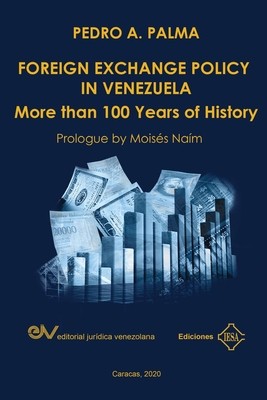
- We will send in 10–14 business days.
- Author: Pedro A Palma
- Publisher: Fundacion Editorial Juridica Venezolana
- ISBN-10: 1636255175
- ISBN-13: 9781636255170
- Format: 15.2 x 22.9 x 2.3 cm, softcover
- Language: English
- SAVE -10% with code: EXTRA
FOREIGN EXCHANGE POLICY IN VENEZUELA. More than 100 Years of History (e-book) (used book) | bookbook.eu
Reviews
Description
For several decades of the twentieth century, Venezuela enjoyed a prolonged period of low inflation, high growth, and social progress. During those years, a fixed-exchange-rate policy was followed that could be characterized as highly successful. However, things changed radically beginning in the mid-1970s. The economy's heavy dependence on oil revenue made it extremely vulnerable, at the mercy of volatile international petroleum prices.
In this period of economic swings, which has been underway for more than 45 years, multiple exchange-rate policies have been implemented. They have had decisive impacts on the country's economic, social, political, and institutional conditions. That has made the Venezuelan economy a foreign-exchange experimentation lab.
This book discusses the characteristics of these different foreign exchange policies, their evolution, their effectiveness, and the consequences they have brought about. The conclusions focus on what might be the most suitable foreign-exchange policy for Venezuela and the right way forward to getting the country out of the disarray it finds itself in today.
*****
This book is destined to be a must-read for university study programs everywhere. It will enrich the libraries of economics schools, research centers, governments, companies, and international organizations. I have no doubt that it will be useful, not only for Venezuelans but also for analysts and academics worldwide. And for those for whom the Venezuelan phenomenon produces great perplexity (for, how did such a rich country become so poor?), it is an invaluable guide to mistakes to be avoided.
Moisés NaÃm, PhD
Distinguished Fellow
Carnegie Endowment for International Peace
EXTRA 10 % discount with code: EXTRA
The promotion ends in 16d.16:58:17
The discount code is valid when purchasing from 10 €. Discounts do not stack.
- Author: Pedro A Palma
- Publisher: Fundacion Editorial Juridica Venezolana
- ISBN-10: 1636255175
- ISBN-13: 9781636255170
- Format: 15.2 x 22.9 x 2.3 cm, softcover
- Language: English English
For several decades of the twentieth century, Venezuela enjoyed a prolonged period of low inflation, high growth, and social progress. During those years, a fixed-exchange-rate policy was followed that could be characterized as highly successful. However, things changed radically beginning in the mid-1970s. The economy's heavy dependence on oil revenue made it extremely vulnerable, at the mercy of volatile international petroleum prices.
In this period of economic swings, which has been underway for more than 45 years, multiple exchange-rate policies have been implemented. They have had decisive impacts on the country's economic, social, political, and institutional conditions. That has made the Venezuelan economy a foreign-exchange experimentation lab.
This book discusses the characteristics of these different foreign exchange policies, their evolution, their effectiveness, and the consequences they have brought about. The conclusions focus on what might be the most suitable foreign-exchange policy for Venezuela and the right way forward to getting the country out of the disarray it finds itself in today.
*****
This book is destined to be a must-read for university study programs everywhere. It will enrich the libraries of economics schools, research centers, governments, companies, and international organizations. I have no doubt that it will be useful, not only for Venezuelans but also for analysts and academics worldwide. And for those for whom the Venezuelan phenomenon produces great perplexity (for, how did such a rich country become so poor?), it is an invaluable guide to mistakes to be avoided.
Moisés NaÃm, PhD
Distinguished Fellow
Carnegie Endowment for International Peace


Reviews